
Traditionally, law is defined as a set of rules enforceable by social institutions. However, there are several other definitions of the word law. Legal issues arise when people have trouble with money, housing, family, and other problems. These may also involve the possibility of a crime. The outcome of these matters depends on the decision of the court. A judge has the authority to make rulings on the law but does not command police forces. A lawyer can provide information about the law and its effects.
Legal systems are usually divided into common law and civil law. The common law system is more detailed, and requires more judicial decisions. The common law system includes the doctrine of precedent, which means that decisions made by higher courts are binding on lower courts. In addition, some common law jurisdictions explicitly acknowledge the fact that they are making “law.”
While law is the body of rules enforceable by governmental institutions, there is a controversy over whether the content of law is purely political or moral. According to both positions, law is an expression of the relation between a community and its members. It can serve to maintain the status quo, protect individuals against majorities, or to preserve individual rights. There are also legal systems that are more effective at these goals than others.
For example, the concept of natural law emerged in the ancient Greek philosophy. It was re-entered into mainstream culture through the writings of Thomas Aquinas. Religious law is based on religious precepts. Jewish Halakha and Islamic Sharia are examples of religion-based laws. In some church communities, Christian canon law has survived.
While the notion of law is a universal one, the actual practices and procedures that create it vary widely from country to country. Some countries have had very strict laws, while other countries have very lax regulations. In some countries, it is possible to create legally binding contracts without the involvement of a lawyer. In other countries, the law has been made by a government or executive.
Law is also a source of moral philosophy. Naturalists argue that it is a product of human reason and conscience, while positivists argue that it is an expression of governmental authority. In the past, utilitarian theories were dominant in the law, but their dominance has been waning in recent years.
There are four universal principles that constitute a working definition of the rule of law. These principles are: impartiality, accessibility, independence, and justice. They were derived in accordance with international standards and tested in consultation with a wide range of experts around the world.
In modern times, the concept of law has spread into virtually every area of life. From banking, to consumer protection, to taxation, to criminal procedure, to regulation of utilities, and even energy, there are many ways that laws have shaped our lives. It is important to remember that while these regulations are often designed to promote social justice, the consequences of breaking the law differ from those of breaking social rule.
